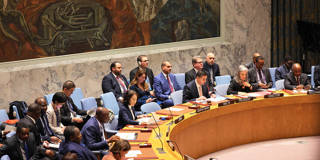The war in Ukraine has highlighted the shaky foundations of the international security order, underscoring the impotence of the body in charge of maintaining world peace. To fulfill its peacekeeping role and stop aggressors like Vladimir Putin, the Security Council should grant veto power to Germany and Japan.
TOKYO – The first anniversary of Russia’s invasion of Ukraine has been a good opportunity to reflect on the war’s global implications. In addition to untold human misery, Russia’s aggression triggered a historic food and energy crisis and caused global inflation to spike, endangering the world’s fragile economic recovery from COVID-19. But the war also highlighted the shaky foundations of the international security order that emerged after the end of World War II, sending shockwaves around the world and encouraging countries like Germany and Japan to rearm.

TOKYO – The first anniversary of Russia’s invasion of Ukraine has been a good opportunity to reflect on the war’s global implications. In addition to untold human misery, Russia’s aggression triggered a historic food and energy crisis and caused global inflation to spike, endangering the world’s fragile economic recovery from COVID-19. But the war also highlighted the shaky foundations of the international security order that emerged after the end of World War II, sending shockwaves around the world and encouraging countries like Germany and Japan to rearm.